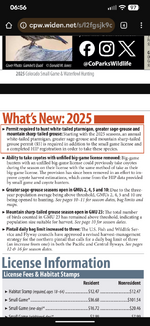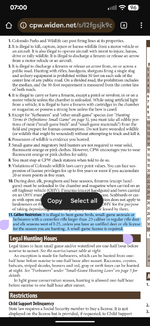Wyoming300
FNG
- Joined
- Jul 20, 2025
- Messages
- 71
Its a federal law its not the states.Is it difficult to tell them you didn't hunt coots, rails, or gallinules?
Follow along with the video below to see how to install our site as a web app on your home screen.
Note: This feature may not be available in some browsers.
Its a federal law its not the states.Is it difficult to tell them you didn't hunt coots, rails, or gallinules?
The year round small game license followed by "I'm hunting" circumvents a handful of CO laws, including some of the new firearms ones.Totally missed that then, it was my main motivation when I got my permit.


This one i disagree with. There was a wyoming bow hunting guide who was killed by a bear while cutting up an elk about 15 years ago.Same in NY. I can't CC when bow hunting.
I have almost every game tag when im out hunting. Honestly i just say im hunting rabbits when people ask me.The year round small game license followed by "I'm hunting" circumvents a handful of CO laws, including some of the new firearms ones.
...except for coyote hunting during a big game season
I never followed up with your suggested person but still want to see in writing what the state defines “hunting” as in a door to door aspect in regards to the locked case in locked vehicle law.The year round small game license followed by "I'm hunting" circumvents a handful of CO laws, including some of the new firearms ones.
...except for coyote hunting during a big game season
It is actually a general statute in MN and not a "Hunting Regulation":That needs to be written as a law? Yikes. Don’t hunt Minnesota
It should be defined in CRS title 33-1-102, whatever definition is in there is what I would default to if I wanted to write that.I never followed up with your suggested person but still want to see in writing what the state defines “hunting” as in a door to door aspect in regards to the locked case in locked vehicle law.
I would love to know how "worrying" game became hunting.Idaho's definition of hunting is broad and can definitely hang a person up.
Definition of Hunting Hunting means chasing, driving, flushing, attracting, pursuing, worrying, following or on the trail of, shooting at, stalking, or lying in wait for any wildlife whether or not such wildlife is then/ or subsequently captured, killed, taken, or wounded.
You'd be surprised...clients would cut their own meat many times instead of having us bring them to the processor...especially if they shot something late in the hunt. I would say a good 25% missed taking the inner loins sometimes in multiple animals in the same group.Also, how many folks are leaving the inner loins behind?!
I agree that is the "spirit" of the law and I'll continue to use a flashlight walking in/out because my purpose for using the light fails under legal usage. However, carrying "any firearm, bow, or other implement whereby game could be killed or taken" while searching for wounded game in the dark with a flashlight could get someone hung up.That one obviously does not mean go hunting without a flashlight. It simply is for an easy win to make an arrest for people who are obviously poaching and causing issues.
No, I don't believe photographers or bird watchers need a hunting license.I would love to know how "worrying" game became hunting.
Also, do bird watchers and wildlife photographers need a hunting license in Idaho?
Absolutely. It's amazing that people blindly promote things, they've "heard" without actually investigating for themselves.This thread is a good example of actually reading the rules/regulations/laws rather than relying on hearsay. Four incorrect posts about Colorado from four different people who believed they were right enough to post it. I've read some wonky "the law is ____" stuff on here for sure.
Its a federal law its not the states.
This one i disagree with. There was a wyoming bow hunting guide who was killed by a bear while cutting up an elk about 15 years ago.
Yea. And?
While it's stupid that NY and California prohibit carrying a handgun while bow hunting, I think we can all agree the likelihood of a bow hunter in NY being killed by a grizz is just about zero.
While it's stupid that NY and California prohibit carrying a handgun while bow hunting, I think we can all agree the likelihood of a bow hunter in NY being killed by a grizz is just about zero.
Me saying a bear and you saying a grizz, well thats two different species.
Most of wyoming has black bears. There was a black bear in a city park in cheyenne last year.
Grizzlies are only around yellow stone.
A lot of the us does have big black bears.
Its also important to realize black bears arent always black. Many are tan brown or cinnamon. Grizzlies have a hump and get much larger.
Its the proximity of the bear thats the threat, not the size.
I’ll admit that I was wrong about the CO let off thing. It used to be a rule in 2021 (p.14 in the regs that year), but they did change it in 2022 (see image). Clearly I haven’t read the CO regs fully in recent years since I haven’t been applying. Thanks for the correction.Absolutely. It's amazing that people blindly promote things, they've "heard" without actually investigating for themselves.
Grizzlies aren't only around Yellowstone, and the guide was killed by a grizzly. You might want to quit while you're ahead.Me saying a bear and you saying a grizz, well thats two different species.
Most of wyoming has black bears. There was a black bear in a city park in cheyenne last year.
Grizzlies are only around yellow stone.
A lot of the us does have big black bears.
Its also important to realize black bears arent always black. Many are tan brown or cinnamon. Grizzlies have a hump and get much larger.
Its the proximity of the bear thats the threat, not the size.
